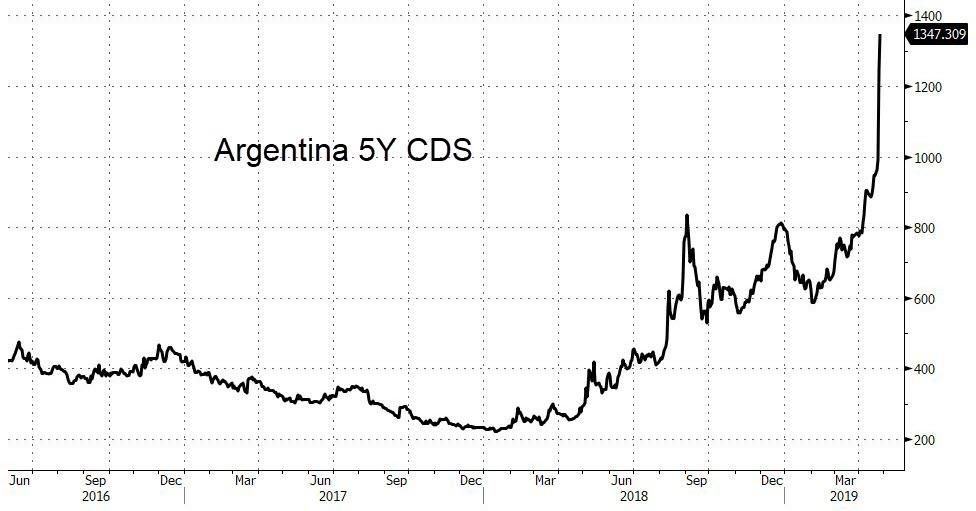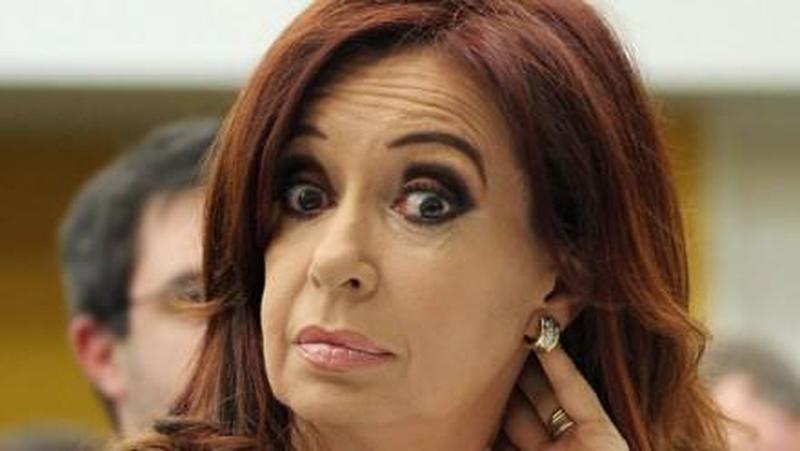Argentina’s credit and FX markets are crashing for a second day, signaling an implied probability-of-default gauge over 60%, as investors rapidly lose faith that President Macri will fend off his populist foes and win re-election this year.
In comments, Macri admitted that the market volatility is stemming from the political uncertainty but said he believes it’s wrong to expect Argentines will elect his political opponents.
“The world isn’t sure whether Argentines want to go back, and that makes the world very concerned — sovereign risk goes up, they take more defensive positions,” Macri said in a radio interview.
“I think they’re wrong, they’re wrong. We Argentines aren’t going back” to the past.
But that did not reassure investors who have dumped the peso (to a record low against the dollar)…
And credit risk has exploded…
The weakness is exacerbating the situation as rising borrowing costs and a weakening peso translate into higher inflation expectations, eroding support for Macri, JPMorgan analysts wrote in a note late Wednesday. That “negative feedback loop,” added to worse-than expected inflation, are the main drivers behind Argentina’s dire situation, they added.
“At the current juncture the market seems to be looking for a circuit breaker to that negative feedback loop,” the analysts said.
Bloomberg notes that while the peso has depreciated significantly throughout the year, the level it may reach in case of a peronist’s win in the October election is completely clouded. The reason: during Kirchner’s term, Argentina didn’t even have a floating currency market, so any attempts to discount a CFK future appear doomed. Still that is not preventing traders from trying: “44/USD doesn’t have a Kirchner victory priced in. We have a view that 48 would be a signal for a Kirchner win,” said Brendan McKenna, a strategist at Wells Fargo. Market’s base case scenario is still a Macri’s victory even though his odds are deteriorating recently.
Alberto Ramos, head of Latin America research at Goldman Sachs, has different view. For him, investors are “already pricing in less than 50% odds for Macri” as it clearly seems the election is slipping away from President’s hands due to negative activity, according to Bloomberg.
Morgan Stanley, meanwhile, takes the other side of the trade arguing that the “base case scenario is policy continuity ahead of October 27 elections”, even though lack of clarity with short-term scenario led him to recommend staying neutral in Argentina.
To be sure, CFK is doing all she can to reclaim the presidency, and this week released an autobiographical book called “Sincerely,” further raising her profile ahead of the vote.
As Daniel Lacalle recently noted, the Argentine economy is more fragile and vulnerable than similar ones. However, Argentina is also one of the countries with the highest economic potential. There are five essential factors to understand the weakness of the economy:
-
The Peso. Despite the dovish policies of the Federal Reserve and the change of course in the process of normalization, the Peso is, again, the worst performing currency against the dollar in 2019. The dollar index has not moved much against its basket of currencies, therefore, it is the disastrous monetary policy that made the Peso plummet. A weak currency is a danger to the stability of the country and the successive governments only seem to want to patch up the mistaken monetary policy of the Central Bank. A weak Peso does not make the Argentine economy more competitive or export more, as reality shows. If the country does not address in a serious and determined way the error of maintaining a currency in a constant process of destruction of its purchasing power, it will simply move from crisis to crisis again.
-
Monetary policy is also seriously inflationary. Not by mistake, but by design. Governments prefer to see high inflation and blame an inexistent external enemy than to stop financing the bloated public spending with newly printed currency. The loss of purchasing power of the currency is added to an inflation rate that should not correspond to a country with the potential and human capital of Argentina. Argentina has been, for many years, a country with the potential of a developed economy and a monetary policy of a third-world country. It has followed the MMT recommendations for years. Many claim that dollarization would be worse because it was already attempted and led to a crisis, except that this argument is false. Argentina did not dollarize, it carried out an exchange rate subterfuge by pegging the Peso to the US Dollar with a completely inflated exchange rate that led to the accumulation of imbalances. Argentina did not have dollars, it had pesos in disguise. Dollarization is what Ecuador did, abandoning the sucre , which allowed the country to avoid a Venezuelan-style hyperinflation.
-
Very high taxes. Argentina’s tax wedge remains the highest in the region and one of the highest for companies in the world,. This constant expropriation of wealth via currency devaluation, inflation and taxes work as a huge barrier to international investment, growth and job creation. In Argentina, one always hears that “tax revenues are low” and that therefore taxes cannot be cut. However, raising them puts a lid on job creation, productive investment and the attraction of capital, and revenues are even lower.
-
High government expenditure. Denying the depressive effect of extractive political spending, within a public expenditure that already reaches more than 45% of GDP, is a problem for a country with high potential. It not only is the highest public expenditure in the region but the most inefficient according to the Inter-American Development Bank. The inefficiency of public spending in Argentina reaches 7.2% of GDP.
-
The loopholes of protectionism. According to the global competitiveness index of the World Economic Forum, Argentina is ranked 92 out of 137 countries. The deterioration trend generated between 2012 and 2015 has been reduced for three years, but the challenges are important. One of them is to eliminate the loopholes of anti-trade and protectionist measures imposed from the short-sighted perception that protectionism would replace imports and strengthen the economy while printing money would spur growth. There are still significant recesses of that period that act as a disincentive to growth and, above all, as a warning to global investors who prefer to avoid long-term and capital intensive investment in Argentina.
It is true that some measures have been taken to reverse these elements of fragility, but reforms must be more courageous to prevent the economy from falling further in 2019 and 2020.
via ZeroHedge News http://bit.ly/2GyENsd Tyler Durden


